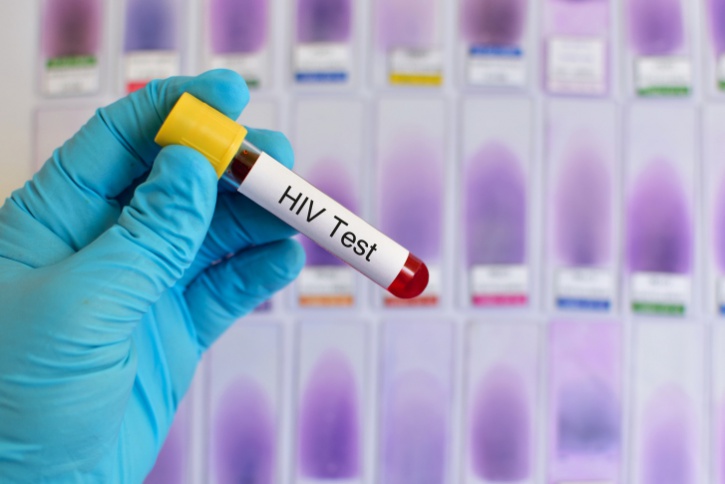
A positive HIV test is scary news...but it's no longer a 100% death sentence. As better therapies continue to be developed, it's entirely possible to live a more normal life. The key? Being informed and taking charge of your health.
Despite all the support you will get, particularly in the beginning, the real work is up to you. Given the right attitude and the right information, most people can live longer than they could when HIV/AIDS cases were first being diagnosed.
After your positive diagnosis, you need to do:
- Develop a strategy to adapt to your new situation.
- Learn more about HIV and how it can affect you.
- Understand the medical tests you'll use.
- Find ways to promote and maintain your health.
HIV and Your Immune System
HIV (human immunodeficiency virus) is the virus that causes AIDS (Acquired Immune Deficiency Syndrome). Being HIV-positive does not mean that you have AIDS, but it does mean that you may develop AIDS. HIV attacks your immune system, gradually impairing how it functions.
Your immune system helps keep your body healthy by recognizing and attacking foreign substances, like viruses or bacteria. Over time, if it becomes seriously damaged or weakened by HIV, your body loses its ability to fight certain infections and cancers. These are called opportunistic infections (OIs).
AIDS is the most serious outcome of HIV infection. It occurs once your immune system has been significantly damaged. If you have certain OIs, it will lead to an AIDS diagnosis. This is because the presence of these OIs in your body points to a significantly damaged immune system.
An AIDS diagnosis will also be given if the counts of your immune system cells (called CD4+ T cells or simply CD4s) fall below 200. These cells are the key players in your immune system. Their "normal" range in a healthy HIV-negative person is 500–1,500 cells/mm3.
This gradual destruction of the immune system doesn't happen the same way in everyone, or even at the same pace. In some, it may not happen at all. In a small percentage of people, HIV destroys their immune systems very rapidly, in just a few years. But others remain well for 10–15 years or longer. On average, without using HIV therapy, most people remain well for about ten years before facing their first serious symptoms.
A number of things are well known about HIV infection: Viral load tests measure the amount of HIV in the bloodstream. They can generally predict how quickly HIV will damage the...
... immune system. In effect, these tests predict the loss of CD4 cells: the higher the number, the greater the risk of damage to your immune system. Using effective treat¬ments can greatly reduce the level of HIV and slow its rate of disease progression.
• CD4 cell count tests measure the level of CD4 cells, a certain type of white blood cell. These tests can measure the decline of your immune health. However, taking HIV therapy can slow the decline of your immune health. In fact, many people who start HIV therapy experience a significant increase in their CD4 counts.
• For long periods, often several years, the body copes effectively with HIV in many people. The number and percentage of CD4 cells fall, but slowly. During this period, most people feel normal and suffer no obvious ill effects. Despite this, most researchers believe that damage is still being done to the immune system. Many scientists believe that early inter¬vention during this time may have the greatest impact, though others remain skeptical. They believe the possible side effects from early treatment might outweigh its benefits.
• Without treatment, the body slowly loses its ability to fight infections. Some infections, like Pneumocystis jiroveci pneumonia (sometimes called PCP), become likely when CD4 counts fall below 300 or 200. Minor infections can occur at counts above 300. Other life-threatening infections become more likely when the count falls below 100 or 50.
HIV/AIDS Disease Progression
HIV is a "spectrum" illness: all who are infected have the same disease, but there are different stages to it. AIDS is the name given only to the later most serious stage. In the earlier and less serious stages, people are HIV-positive, meaning they tested positive on an HIV antibody test but they have no life-threatening symptoms of illness. If left untreated, most people generally progress along the spectrum toward AIDS.
HIV disease can progress slowly or quickly. Several studies have researched the rate at which it progresses when left untreated. Most conclude that about half of HIV-infected people progress to AIDS if left untreated within about ten years of infection. About three out of four (75%) reach AIDS by the 15th year.
These studies conclude that HIV is a progressive disease that leads to symptomatic illness in most people over time. Children born with HIV and people infected through blood trans¬fusion seem to get sick more quickly. Studies suggest that when women have access to and seek regular care and monitoring, their progression rates are similar to and perhaps even slower than men. Studies that include people with hemophilia are inconclusive about their rates of progression.
Why people progress at different rates is uncertain. It may be due to differences in the strain of HIV a person gets. Others believe it is influenced by genetic differences in people, while others suspect that lifestyle factors make a difference.
Check Your Immune Health
With most illnesses, we wait until a disease shows up before doing anything about it. "If it ain't broke, don't fix it." But in HIV disease, the immune system starts to "break" immediately, not just when OIs show up. So keeping an eye on the health of your immune system is critically important. Two common ways to do this are: (1) noticing when symptoms occur and (2) getting lab tests done. Each can appear to have advantages and disadvantages.
Notice When Symptoms Occur
This approach waits for active infections and disease to occur. In HIV, this means watching out for such things as thrush (yeast infections), PCP, Kaposi's Sarcoma (KS) lesions and so on.
You & Your Doctor: A Lifesaving Team
The first thing to keep in mind as you consider an HIV treatment program is that you are the most important member of the treatment team. Be sure you find someone with whom you can work, ask questions, and address your concerns. When you begin to receive medical care for HIV, it is important to do your homework. Depending on your insurance plan, availability of physicians will vary. Learn about providers in your community that currently work with HIV patients. Most major hospitals will have physicians who specialize in treating HIV disease. You should look for a doctor who has experience with HIV, as treatments and medications change rapidly. Feedback from other patients can also help you choose a provider. If you are involved with a community organization or support group, ask other patients about their experiences with their physicians.
Depending on where you were tested for HIV, you may or may not be connected with a doctor. It is important to receive medical treatment from an experienced HIV provider: if you don't have one, ask for referrals. When and if you and your doctor decide to begin treatment, it is very important to stick with the agreed-upon plan. If you are having any problems adhering to the plan (for example, taking medications as directed), contact your doctor as soon as possible.
Drug and Alcohol Addiction Support
If you feel you may have a problem with drugs or alcohol, be proactive and ask for help. Fighting addiction to drugs and/or alcohol can be difficult. However, there are a variety of resources and support services available nationwide. Taking steps to address your drug and alcohol use will help you be more prepared to deal with your HIV diagnosis. The longer you put off dealing with substance abuse problems the more you may damage your body.
Investigate Your Health Benefits
Medical treatments for HIV are very expensive. It is extremely important to be knowledgeable about your health insurance options. If you are currently covered by an insurance plan, investigate the limits of your policy. Explore whether or not
you have access to an HIV specialist. Don't be afraid to speak with a customer service representative should you have questions about your policy. Some people worry about their insurance companies learning about their HIV status. By law, if you are currently insured and test positive, you cannot be discharged from your insurance plan. If you have specific questions about your policy and do not feel comfortable talking with your employer or company representative you should consider contacting the National AIDS hotline at 1-800-342-2437 (AIDS). Hotline staff will try to locate a local case manager in your area who can help you investigate your plan.
AIDS Drug Assistance Programs
You may find that your health plan has a cap on annual medication costs. For some people who do not have adequate prescription drug coverage, there is a federal program called the AIDS Drug Assistance Program (ADAP). ADAP was designed to provide access to expensive HIV medications for people who are considered to be underinsured or have no insurance. Eligibility for ADAP is determined based on your financial situation. Eligibility will also vary from state to state, as will the number of medications covered. States with larger numbers of people living with HIV tend to have a larger list of covered medications.
If you are currently unemployed or have a low income, you may be eligible for Medicaid. Medicaid is a federal program that provides health care for people who cannot afford to purchase insurance on their own. If you qualify for supplemental security income (SSI), you will automatically receive Medicaid.
Protecting Yourself & Others
Surprisingly, even with all the staggering numbers of new HIV/AIDS diagnoses, HIV is actually not easily transmitted. In order to transmit HIV, there must be an exchange of body fluids, blood, semen, vaginal secretions, or breast milk.
Today, HIV is most often transmitted through unprotected sexual contact. This includes oral, anal, and vaginal sex. Using condoms will significantly reduce the risk of transmitting HIV to a sexual partner. If you are using intravenous drugs, do not share needles with others. HIV can be transmitted through breast milk, therefore new mothers are advised against breast-feeding. Women who are pregnant can take medications to reduce the risk of transmission to their child.
Educating Yourself
We are learning more each day about HIV and its treatment. Try to educate yourself. Evaluate which methods of information gathering work best for you. Be careful not to overload yourself and don't forget to stop and take a breath. Most of all, ask for help when and if you need it. Many people living with HIV continue to lead active lives after they are diagnosed. By working closely with your doctor and leading a healthy lifestyle, you can continue to lead a happy and productive life.
Remember, whether you’re HIV positive or not, three steps will continue to be vital, not only for you, but for your loved ones: Be Aware. Get Tested. Use Protection.









